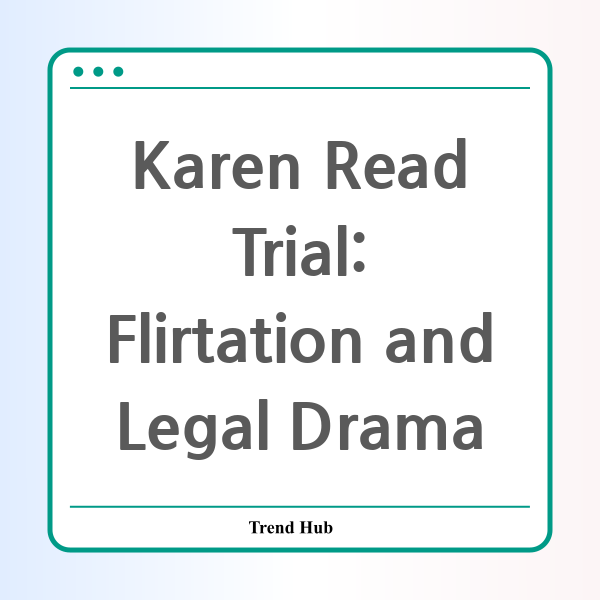* This website participates in the Amazon Affiliate Program and earns from qualifying purchases.

As the courtroom drama surrounding Karen Read’s murder trial continues to unfold, sensational details emerge that capture public attention and raise numerous questions about the circumstances leading to the tragic death of John O’Keefe. Onlookers are captivated not just by the gravity of the charges but also by the intriguing interplay between the key figures involved, notably Read’s flirtatious exchanges with Bureau of Alcohol, Tobacco, Firearms and Explosives agent Brian Higgins.
During the trial, defense attorney Alan Jackson presented text messages exchanged between Read and Higgins during a time frame that is critical to the case. The communications began on January 12, 2022—just 17 days before O’Keefe’s tragic death. The content of these messages depicts a growing flirtation, which has led many to speculate about its possible implications on the case.
Text Messages Reveal a Flirtatious Connection
The tone of the messages escalated quickly, moving from light-hearted banter to apparent romantic interest. Read openly complimented Higgins, stating, "You’re hot," to which Higgins responded, “Feeling is mutual.” Such exchanges raise questions about Read’s relationship with both Higgins and O’Keefe, particularly since the defense suggests that Read was undergoing personal turbulence during this period, further complicating the narrative.
A few days before O’Keefe’s death, Read texted Higgins indicating some personal frustrations: “I was jealous that she had your number.” This admission, paired with the timeline leading to the tragedy, constructs a storyline ripe for speculation. How much influence did this budding connection have on the events that transpired that fateful night?
The Evidence Handling Controversy
As the trial progressed, the emphasis on procedural integrity was spotlighted during the cross-examination of Massachusetts State Police Sgt. Yuriy Bukhenik, who was questioned about the handling and documentation of evidence related to O’Keefe’s death. Defense attorney Jackson confronted Bukhenik about evidence bags, particularly one that was allegedly filled out by a different investigator without proper identification. The testimony journeyed through various points, uncovering potential lapses in protocol during a high-stakes investigation.
This scrutiny raises significant concerns about the reliability and admissibility of evidence. If the evidence collection process is tainted or improperly documented, it can jeopardize the case against Read, leading to debates about her guilt or innocence.
Impact of Initial Assumptions
Further complicating the narrative are initial theories presented by Bukhenik regarding the nature of O’Keefe’s injuries. The sergeant stated he believed a cocktail glass might have been the weapon used against O’Keefe, a theory based on early witness statements. However, evidence soon shifted towards alleging that Read may have struck O’Keefe with her vehicle.
Jackson’s line of questioning regarding the sergeant’s reliance on initial theories offers a compelling glimpse into how early assumptions can drastically alter the course of an investigation. The exchange surrounded **what it means to work from a 'theory'**—a term that Jackson highlighted in a heated debate over Bukhenik’s operational definitions and assumptions that guided his early investigation strategies.
This tense confrontation underscores the complexities of legal terminology and the possible ramifications of misunderstanding between investigators and defense attorneys. It also hints at a larger narrative within the prosecution that may be vulnerable to challenge.
Conclusion: The Intersection of Romance and Justice
The unfolding saga of Karen Read and her connections raises questions not only about her potential culpability but also about the human connections that might influence perceptions of guilt and innocence. As the courtroom drama continues, public interest remains piqued not only by the legal arguments presented but also by the personal stories interwoven within this tragic narrative. How much do our relationships inform our decisions, and what implications does that have in a court of law? These questions linger as the trial progresses.
Ultimately, the outcome remains to be seen, but one thing is clear: the interplay of romance and law is captivating to witness and will have lasting repercussions for all involved.
* This website participates in the Amazon Affiliate Program and earns from qualifying purchases.